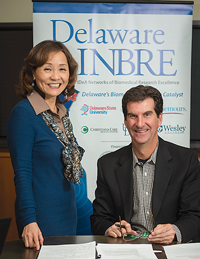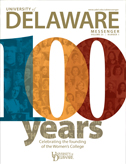Notable Grants

Disease-fighting molecules
UD professors are one step closer to understanding disease. Through a five-year, $11.2 million federal grant, UD scientists will build a network of biomedical researchers who will examine new ways to study cancer and other serious diseases.
The grant, from the National Institutes of Health’s Centers of Biomedical Research Excellence (COBRE) program, supports seven junior faculty members working on five research projects, said principal investigator Joseph M. Fox, professor of chemistry and biochemistry.
Two of the five COBRE projects are focused on specific disorders, Crohn’s and Huntington’s diseases. Another is focused on developing a molecular library that will be screened broadly for drug lead identification, and two other projects are focused on developing underlying technologies that will accelerate the discovery process.
“These projects are tied together under the concept of ‘molecular discovery to improve human health,’” he said. “Through this center, we will be discovering new molecules that can be used to study, and ultimately to treat, human disease.”
Designing biomaterials
Biomaterials, which come in contact with parts of the body for an extended time, are generally defined as substances that have been engineered to interact with living systems in a way that can direct medical therapies or diagnoses.
Think contact lenses and dental fillings, in the simplest sense.
At UD, faculty use their understanding of chemistry, biology, physics and other fields to design and make new biomaterials. Through a five-year, $5.85 million grant, the University will extend this interdisciplinary research program.
Directed by Tatyana Polenova, professor of chemistry and biochemistry, the grant will support research on biomaterials for uses such as tissue regeneration, tissue engineering and drug delivery.
The most recent grant is funded by the National Institutes of Health and is part of the NIH’s Centers of Biomedical Research Excellence (COBRE) program.
This COBRE project began with a grant in 2003, won a competitive renewal from the NIH in 2008 and will now enter its third five-year phase, which will continue until 2019.

Strengthening biomedical research
Delaware INBRE, the Idea Network of Biomedical Research Excellence, will continue its collaborative efforts to increase biomedical research capability, improve disease outcomes and drive economic growth through its statewide network, thanks to a five-year, $18.2 million grant from the National Institutes of Health.
The goal of INBRE is to grow statewide research capacity through collaborations in research, professional development, equipment and infrastructure purchases and mentoring.
“Delaware has incredibly talented professionals with an enterprise-oriented attitude,” said Steven J. Stanhope, associate vice provost for research at the University and principal investigator of Delaware INBRE. “We have broken down barriers between institutions and created model systems for how to develop partnerships. Our researchers are really unmatched in their abilities to partner across our great collaboration state.”
This is the second renewal for the Delaware INBRE program, which represents a collaboration with six statewide research institutions—UD, Wesley College, Delaware Technical Community College, Delaware State University, Christiana Care Health System and Nemours/Alfred I. duPont Hospital for Children.
The grant will fund two rounds of 12 investigators who are focusing on research in cancer, cardiovascular health and neuroscience, along with the purchase of additional research equipment. Half of the INBRE investigators are women, and the IDeA program aims to increase diversity among its participants.





